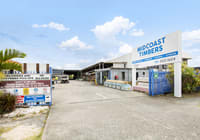Dexus posts turnaround profit amid funds challenge
- Follow our live coverage of the August 2025 ASX reporting season
Dexus chief executive Ross Du Vernet has called out the inflection point for the nation’s battered commercial real estate market, a shift that has helped the property giant into a turnaround profit for its 2024-25 financial year.
The turning market is also welcome news for Dexus, which, alongside its own investment portfolio, runs a funds management business that has weathered a series of challenges in the past year.

Dexus’ statutory after-tax profit of $136.1 million for 2024-25 stands in sharp contrast to the $1.58 billion loss it racked up the previous year, on the back of hefty writedowns recorded against its property portfolio.
“We generally feel like we’ve passed the inflection point in terms of a market recovering,” Du Vernet told The Australian Financial Review.
“The recovery is going to be uneven. I’m not sure we’ve passed the inflection point for everyone. For these high-quality assets – almost irrespective of the sectors – we’re past the inflection point, but if you’re down the quality curve, there may be more pain.”
The hardest-hit sector has been CBD office towers, where valuations have taken a hit over the past two years or more as the switch to working from home, combined with business uncertainty, dented demand for space. Rising interest rates added to the value crunch.
Dexus, one of the nation’s biggest office tower owners, has been particularly exposed to that downward cycle, with more than $20 billion of the $50.1 billion portfolio it owns and manages invested in the sector.
But as its 2024-25 financial results show, its office portfolio reversed previous losses to record a modest 0.4 per cent gain in values in the second half.
“We live or die by what we deliver to our clients and investors,” Du Vernet said. “And the performance of all the portfolios has been really strong, notwithstanding what’s been a very kind of busy and turbulent year for the group.”
Dexus’ heavy investment in the future of the office market is evident with two major projects due for completion late next year and in 2028: the Atlassian Central building in Sydney and the Waterfront development in Brisbane, respectively.
The Brisbane project in particular has been plagued by delays, which Dexus said have been due to bad weather and issues in the ground rather than Queensland’s industrial relations culture.
Yet, according to Du Vernet, the Waterfront project, which is only 52 per cent leased, is also an example of how Dexus expects to benefit as momentum returns to the office market.
With very little new supply coming into the major CBD markets, due to prohibitive construction costs, landlords with projects already under way can take advantage of major corporates looking for high-amenity digs, according to Du Vernet and Dexus office chief Andy Collins.
“If you think about how our portfolio is set up today, we’re going to get all the benefit of that,” Du Vernet said.
Dexus’ funds from operations, a property sector earnings measure that factors out fluctuations in portfolio valuations, dipped 3.7 per cent to $677.2 million.
Du Vernet and his team are keeping a close eye on Dexus’ funds management business, after the platform lost control of its $830 million half-interest in Sydney’s Macquarie Centre and faces a legal challenge from co-investors over its prized stake in Melbourne Airport.
Despite ructions in the funds business, Dexus derives the vast bulk of its income, 83 per cent, from its own investment portfolio, Du Vernet said.
Dexus’ funds platform must still meet $3 billion in redemption requests from investors in its wholesale funds. While its two biggest unlisted property funds outperformed their industry benchmarks, selling off assets to meet the requests is likely to eat into Dexus’ revenue as funds under management are reduced proportionately.
“Clearly, where you have litigation, it does make it hard to raise money in those products because there’s an amount of uncertainty. So, without a doubt that has had an impact on those products,” Du Vernet said.
Dexus delivered an adjusted FFO of $483.9 million, equivalent to 45¢ per security, in line with its guidance for the 2024-25 financial year and market consensus. Distributions totalled 37¢ per security.
Its expectation for the coming year is to hold steady with adjusted FFO of 44.5¢ to 45.5¢ per security and distributions of 37¢.











